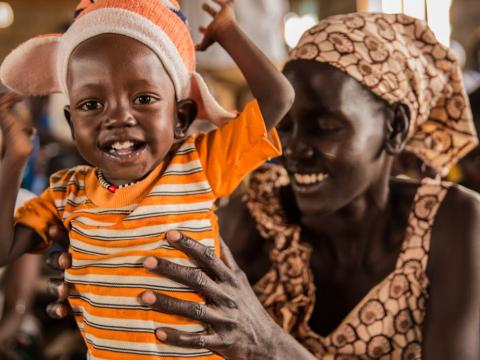Giving cash: More than 80,000 people in South Sudan benefitting

World Vision is providing families of six the equivelent of $45 US cash each month. The cash is working wonders, restoring hope for people who have seen hopeless situations.
“People were killing each other in my village and my husband was one of the men, who lost his life. After seeing him dead, I grabbed Garang and my other son and fled. It was a tough journey and I wasn’t sure if we’d make it at all, but it was time to go and find safety,” says Acheng, the mother of 18-month-old Garang.
Acheng fled their home in Bor and arrived in Juba facing a desperate situation.
“He was very malnourished back then and I wasn’t even sure he would survive. I had no food and no milk to give him,” she remembers, talking quietly about the pain she went through.
But hope came, in the way of a World Vision programme.
Acheng began attending a cash for training programme in urban Juba, helping her – and 1,080 other beneficiaries in this neighbourhood project – overcome the hunger crisis in South Sudan.
The idea behind the initative is simple: beneficiaries receive a small amount of cash to feed their families, while they attend vocational training and awareness raining sessions once a week.
Susanna, a grandmother taking care of two of her orphaned grandchildren, also fled violence and found solace among the group.
"I hadn't seen anything like it when I first joined: over a hundred women had come together to share experiences and learn new skills."
Across South Sudan, World Vision provides more than 80,000 people cash each month.
Gift Sibanda, a World Vision cash programming specialist in South Sudan, says the amount a family of six receives is about the equivelent of $45 US.
With cash, "Families get the power to decide the typ of food they prefer. It gives dignity to families because they are able to budget on their own. Giving cash has a multiplier effect. Since the families use the cash to purchase food at their local market, it contributes in a small way to the local economy and employment," Gift explains.
The statement certainly rings true for Acheng and Susanna.
Acheng used the money to buy food, and that helped Garang recover from malnutrition.
“Garang will be finishing his nutrition supplements soon as well, because he is much better,” Acheng says as she watches Garang devour a bag of ‘plumpy nut’, a nutritious paste to give to malnourished children.
With both training and money, Acheng is determined to start a small business.
“The programme has changed my life." - Acheng
"It’s still hard that my husband is not with us anymore. When my kids are older, I will tell them that the crisis took their father. Then I will make sure that they go to school and become educated,” she says.
Meanwhile, Susanna used the money to ensure her grandson Sepit could go to school.
"I've always had many plans for my children, but I am now confident that they can actually come true," she says. "I want to see them in good health, receiving a good education. I want their eyes to be opened. If they are educated, they can see far, and they can bring change to our country."
World Vision is continuing to respond to the ongoing hunger crisis caused by South Sudan's conflict. Since January 2017, more than one million people have been reached through various response programming including cash and food assistance, nutrition programming and clean water, sanititation and hygiene services.
Rebecca and her daughter are two more of the beneficiaries
from World Vision's cash for training programme.
- article and photos by Stefanie Glinski


